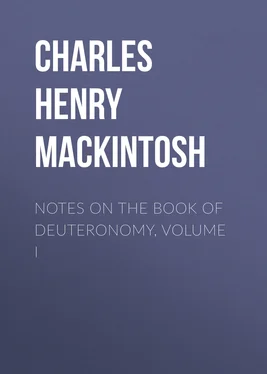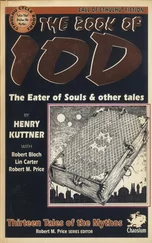Charles Henry Mackintosh - Notes on the Book of Deuteronomy, Volume I
Здесь есть возможность читать онлайн «Charles Henry Mackintosh - Notes on the Book of Deuteronomy, Volume I» — ознакомительный отрывок электронной книги совершенно бесплатно, а после прочтения отрывка купить полную версию. В некоторых случаях можно слушать аудио, скачать через торрент в формате fb2 и присутствует краткое содержание. Жанр: foreign_prose, foreign_antique, на английском языке. Описание произведения, (предисловие) а так же отзывы посетителей доступны на портале библиотеки ЛибКат.
- Название:Notes on the Book of Deuteronomy, Volume I
- Автор:
- Жанр:
- Год:неизвестен
- ISBN:нет данных
- Рейтинг книги:4 / 5. Голосов: 1
-
Избранное:Добавить в избранное
- Отзывы:
-
Ваша оценка:
- 80
- 1
- 2
- 3
- 4
- 5
Notes on the Book of Deuteronomy, Volume I: краткое содержание, описание и аннотация
Предлагаем к чтению аннотацию, описание, краткое содержание или предисловие (зависит от того, что написал сам автор книги «Notes on the Book of Deuteronomy, Volume I»). Если вы не нашли необходимую информацию о книге — напишите в комментариях, мы постараемся отыскать её.
Notes on the Book of Deuteronomy, Volume I — читать онлайн ознакомительный отрывок
Ниже представлен текст книги, разбитый по страницам. Система сохранения места последней прочитанной страницы, позволяет с удобством читать онлайн бесплатно книгу «Notes on the Book of Deuteronomy, Volume I», без необходимости каждый раз заново искать на чём Вы остановились. Поставьте закладку, и сможете в любой момент перейти на страницу, на которой закончили чтение.
Интервал:
Закладка:
Thus, not only have we both time and place set forth with divine precision and minuteness, but we also learn, from the words just quoted, that the communications made to the people in the plains of Moab were very far indeed from being a repetition of what has come before us in our studies on the books of Exodus, Leviticus, and Numbers. Of this we have further and very distinct proof in a passage in chapter xxix. of the book on which we are now entering.—"These are the words of the covenant which the Lord commanded Moses to make with the children of Israel in the land of Moab, beside the covenant which He made with them in Horeb ."
Let the reader note particularly these words. They speak of two covenants—one at Horeb and one in Moab; and the latter, so far from being a mere repetition of the former, is as distinct from it as any two things can be. Of this we shall have the fullest and clearest evidence in our study of the profound book which now lies open before us.
True, the Greek title of the book, signifying the law a second time, might seem to give rise to the idea of its being a mere recapitulation of what has gone before; but we may rest assured it is not so. Indeed, it would be a very grave error to think so. The book has its own specific place. Its scope and object are as distinct as possible. The grand lesson which it inculcates, from first to last, is obedience ; and that, too, not in the mere letter, but in the spirit of love and fear—an obedience grounded upon a known and enjoyed relationship—an obedience quickened by the sense of moral obligations of the weightiest and most influential character.
The aged lawgiver—the faithful, beloved, and honored servant of the Lord was about to take leave of the congregation. He was going to heaven and they were about to cross the Jordan, and hence his closing discourses are solemn and affecting in the very highest degree. He reviews the whole of their wilderness history, and that, too, in a manner most touching and impressive. He recounts the scenes and circumstances of their forty eventful years of desert life, in a style eminently calculated to touch the deepest moral springs of the heart. We hang over these most precious discourses with wonder and delight. They possess an incomparable charm, arising from the circumstances under which they were delivered, as well as from their own divinely powerful contents. They speak to us no less effectively than to those for whom they were specially intended. Many of the appeals and exhortations come home to us with a power of application as if they had been uttered but yesterday.
And is it not thus with all Scripture? Are we not continually struck with its marvelous power of adaptation to our own very state, and to the day in which our lot is cast? It speaks to us with a point and freshness as if it were written expressly for us—written this very day. There is nothing like Scripture. Take any human writing of the same date as the book of Deuteronomy; if you could lay your hand on some volume written three thousand years ago, what would you find? A curious relic of antiquity—something to be placed in the British Museum, side by side with an Egyptian mummy, having no application whatever to us or to our time—a musty document—a piece of obsolete writing, practically useless to us, referring only to a state of society and to a condition of things long since passed away and buried in oblivion.
The Bible, on the contrary, is the book for to-day. It is God's own book—His perfect revelation. It is His own very voice speaking to each one of us. It is a book for every age, for every clime, for every class, for every condition—high and low, rich and poor, learned and ignorant, old and young. It speaks in a language so simple that a child can understand it, and yet so profound that the most gigantic intellect cannot exhaust it. Moreover, it speaks right home to the heart; it touches the deepest springs of our moral being; it goes down to the hidden roots of thought and feeling in the soul; it judges us thoroughly. In a word, it is, as the inspired apostle tells us, "quick and powerful, and sharper than any two-edged sword, piercing even to the dividing asunder of soul and spirit, and of the joints and marrow, and is a discerner of the thoughts and intents of the heart." (Heb. iv. 12.)
And then mark the marvelous comprehensiveness of its range. It deals as accurately and as forcibly with the habits and customs, the manners and maxims of the nineteenth century of the Christian era as with those of the very earliest ages of human existence. It displays a perfect acquaintance with man in every stage of his history. The London of to-day and the Tyre of three thousand years ago are mirrored, with like precision and faithfulness, on the sacred page. Human life, in every stage of its development, is portrayed by a master-hand in that wonderful volume which our God has graciously penned for our learning.
What a privilege to possess such a book!—to have in our hands a divine revelation!—to have access to a book, every line of which is given by inspiration of God!—to have a divinely given history of the past, the present, and the future! Who can estimate aright such a privilege as this?
But then, this book judges man—judges his ways—judges his heart. It tells him the truth about himself. Hence man does not like God's book. An unconverted man would vastly prefer a newspaper or a sensational novel to the Bible. He would rather read the report of a trial in one of our criminal courts than a chapter in the New Testament.
Hence, too, the constant effort to pick holes in God's blessed book. Infidels in every age and of every class have labored hard to find out flaws and contradictions in holy Scripture. The determined enemies of the Word of God are to be found, not only in the ranks of the vulgar, the coarse, and the demoralized, but amongst the educated, the refined, and the cultivated. Just as it was in the days of the apostles, "certain lewd fellows of the baser sort," and "devout and honorable women"—two classes so far removed from each other socially and morally—found one point in which they could heartily agree, namely, the utter rejection of the Word of God and of those who faithfully preached it. (Comp. Acts xiii. 50 with xvii. 5.) So we ever find that men who differ in almost every thing else, agree in their determined opposition to the Bible. Other books are let alone. Men care not to point out defects in Virgil, in Horace, in Homer, or Herodotus; but the Bible they cannot endure, because it exposes them and tells them the truth about themselves and the world to which they belong.
And was it not exactly the same with the living Word—the Son of God—the Lord Jesus Christ when He was here among men? Men hated Him because He told them the truth. His ministry, His words, His ways—His whole life was a standing testimony against the world; hence their bitter and persistent opposition. Other men were allowed to pass on, but He was watched and waylaid at every turn of His path. The great leaders and guides of the people "sought to entangle Him in His talk," to find occasion against Him, in order that they might deliver Him to the power and authority of the governor. Thus it was during His marvelous life; and at the close, when the blessed One was nailed to the cross between two malefactors, these latter were let alone; there were no insults heaped upon them—the chief priests and elders did not wag their heads at them. No; all the insults, all the mockery, all the coarse and heartless vulgarity—all was heaped upon the divine Occupant of the centre cross.
Now, it is well we should thoroughly understand the real source of all the opposition to the Word of God—whether it be the living Word or the written Word. It will enable us to estimate it at its real worth. The devil hates the Word of God—hates it with a perfect hatred; and hence he employs learned infidels to write books to prove that the Bible is not the Word of God, that it cannot be, inasmuch as there are mistakes and discrepancies in it; and not only so, but in the Old Testament we find laws and institutions, habits and practices, unworthy of a gracious and benevolent Being.
Читать дальшеИнтервал:
Закладка:
Похожие книги на «Notes on the Book of Deuteronomy, Volume I»
Представляем Вашему вниманию похожие книги на «Notes on the Book of Deuteronomy, Volume I» списком для выбора. Мы отобрали схожую по названию и смыслу литературу в надежде предоставить читателям больше вариантов отыскать новые, интересные, ещё непрочитанные произведения.
Обсуждение, отзывы о книге «Notes on the Book of Deuteronomy, Volume I» и просто собственные мнения читателей. Оставьте ваши комментарии, напишите, что Вы думаете о произведении, его смысле или главных героях. Укажите что конкретно понравилось, а что нет, и почему Вы так считаете.












